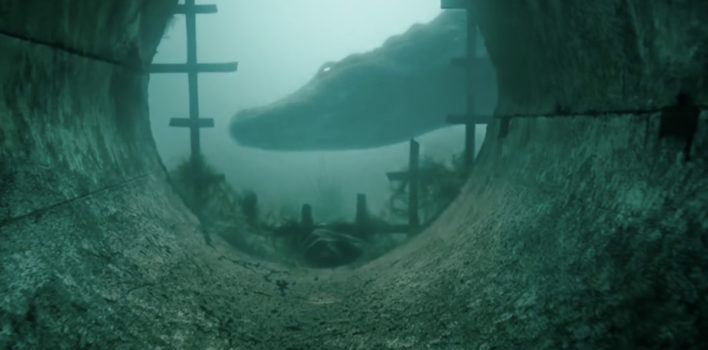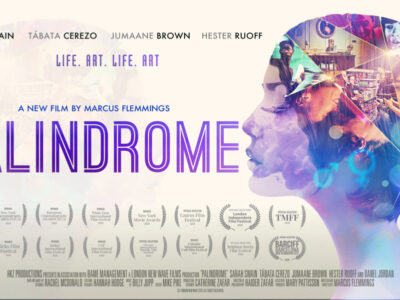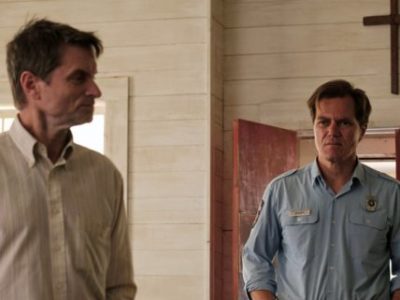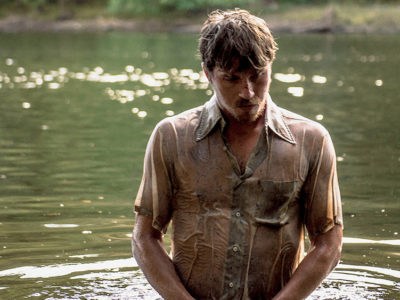Review| Crawl (2019)
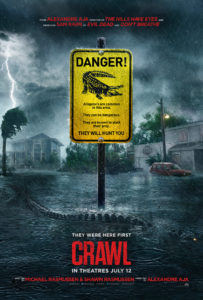 The horror genre, since its inception, has busied itself with social commentary from macro to micro. Standouts have been made across that spectrum. It is one of the many flexible components of genre-filmmaking: the ideas driving the films can be as broad or as specific as the filmmakers want them to be. The cream of the crop are those that are able to marry a specific fear or concern to a wider, more universal human threat. However, the difficulty of even nailing the particular or general ideas are hard enough on their own. Not to mention making the films come alive as entertainment and not just subtext. For horror critics like myself, there is a struggle to read how well that balance is achieved in each film. Some films are light on the commentary, but really entertaining to watch and rewatch. Other films lend themselves to deep analysis around various topics which haunt the country and era in which the films are made. The most analytically rich have a tendency at times to be dry when it comes to the experience of watching them. There is quite a bit of subjectivity involved in delineating these categories as one could see.
The horror genre, since its inception, has busied itself with social commentary from macro to micro. Standouts have been made across that spectrum. It is one of the many flexible components of genre-filmmaking: the ideas driving the films can be as broad or as specific as the filmmakers want them to be. The cream of the crop are those that are able to marry a specific fear or concern to a wider, more universal human threat. However, the difficulty of even nailing the particular or general ideas are hard enough on their own. Not to mention making the films come alive as entertainment and not just subtext. For horror critics like myself, there is a struggle to read how well that balance is achieved in each film. Some films are light on the commentary, but really entertaining to watch and rewatch. Other films lend themselves to deep analysis around various topics which haunt the country and era in which the films are made. The most analytically rich have a tendency at times to be dry when it comes to the experience of watching them. There is quite a bit of subjectivity involved in delineating these categories as one could see.
It is within this subjectivity we get to see what specific people really love and will go to bat for when the general consensus may not be in its favor. Some films, unbeknownst to their makers, fit perfectly within the specific ideals and beliefs of a viewer or critic. Some of the best critical writing comes from the creativity of those who write from a place of passion as they try to carve out a space for the importance of these movies. I won’t say Crawl is perfect for me in this way, but I can envision a world where, years down the road, people come back to it and find a deep appreciation for it. A gem buried for another generation to truly appreciate.
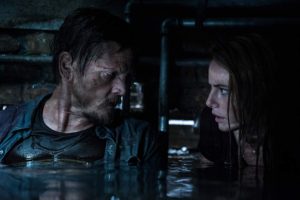 Crawl is a deeply satisfying film, entertaining and tense in all the best ways. There is a lot of CGI, but it’s done in such a way that it doesn’t draw attention to itself and keeps the attention on the characters. It would be nearly impossible to make a film with live alligators without running up against laws surrounding human and animal treatment. Alexandre Aja delivers perhaps his most polished work. He has a good directional sense of structural spaces when it comes to the house and the crawl space underneath it—though that crawl space probably would have been significantly tighter in real life. There is a deeper emotional narrative than a killer alligator film has any right to have which is brought to life by the great Barry Pepper and Kaya Scodelario as father and daughter reconnecting in the midst of their survival. Yet the film still has a mean streak in how willing it is to showcase the gore and viscera associated with an alligator attack. The film doesn’t even spare the dismembering of its two main stars: they are attacked and injured several times throughout the film. Quite resonantly, the characters have to go through a nightmare in order for their relationship to be redeemed, to see how much they love each other.
Crawl is a deeply satisfying film, entertaining and tense in all the best ways. There is a lot of CGI, but it’s done in such a way that it doesn’t draw attention to itself and keeps the attention on the characters. It would be nearly impossible to make a film with live alligators without running up against laws surrounding human and animal treatment. Alexandre Aja delivers perhaps his most polished work. He has a good directional sense of structural spaces when it comes to the house and the crawl space underneath it—though that crawl space probably would have been significantly tighter in real life. There is a deeper emotional narrative than a killer alligator film has any right to have which is brought to life by the great Barry Pepper and Kaya Scodelario as father and daughter reconnecting in the midst of their survival. Yet the film still has a mean streak in how willing it is to showcase the gore and viscera associated with an alligator attack. The film doesn’t even spare the dismembering of its two main stars: they are attacked and injured several times throughout the film. Quite resonantly, the characters have to go through a nightmare in order for their relationship to be redeemed, to see how much they love each other.
However, what makes the film work on a totally abstract level for me is how it is able to strike a balance between the humanist and post-humanist elemental narratives. What makes environmental horror so compelling is how it frames the human story within a bigger landscape of biological life. While the father/daughter story gives us something to hang our emotional, humanist hats on—gives us something to universal to the human story—it is able to place that story within a wider scope of natural indifference. Nature will always be at odds with humanity in simple and profound ways. From a Christian perspective, there is a distinction between man and animal that was built into the very fabric of God’s creative speech-acts. In this way, it would be understandable to see how creation, fallen because of human disobedience, could have a completely different relationship to God than humans do. Because of our separation from the rest of creation, it’s quite possible that we can’t fully comprehend the natural world; we can’t imagine something that doesn’t have us in it. Yet we see the indifference, the potential disconnect, the life-of-its-own that nature has apart from us when we see the effects of storms, animal attacks, and other natural phenomena that strikes.
 Crawl effectively ties the atmosphere and animal life of Florida into the perfect natural nightmare. When human structures come to a standstill due to severe hurricane conditions, it allows for the alligators to have a literal flesh party. Probably the best meal they’ve had all that year. There is beauty to how nature works itself out to maintain its own existence. From a human perspective, this beauty looks like a nightmare of high winds, flooding and alligator carnage. But this is purely nature being nature and it is the outworking of the state that we are responsible for back in the beginning. There is the human story of re-connection over and against the stark realization that what these two are up against doesn’t have their interest in mind. It is just being itself in a fallen world. That interplay of story makes the hope of the human story and the incomprehensible unknowns of the “natural” world much more visceral and intense.
Crawl effectively ties the atmosphere and animal life of Florida into the perfect natural nightmare. When human structures come to a standstill due to severe hurricane conditions, it allows for the alligators to have a literal flesh party. Probably the best meal they’ve had all that year. There is beauty to how nature works itself out to maintain its own existence. From a human perspective, this beauty looks like a nightmare of high winds, flooding and alligator carnage. But this is purely nature being nature and it is the outworking of the state that we are responsible for back in the beginning. There is the human story of re-connection over and against the stark realization that what these two are up against doesn’t have their interest in mind. It is just being itself in a fallen world. That interplay of story makes the hope of the human story and the incomprehensible unknowns of the “natural” world much more visceral and intense.
Crawl might not work for any number of reasons for others, but it struck the perfect chord for where my thought life is as a contemplate the interactions of humanity and the environment. It doesn’t hurt that Pepper and Scodelario added the right amount of gravitas to their parts to play into the nastiness of Aja’s vision. Along with controlled use of CGI to bring about the natural world as nightmare, Crawl gives us an entertaining vision of the relationship and disconnect that happens between man and nature.


